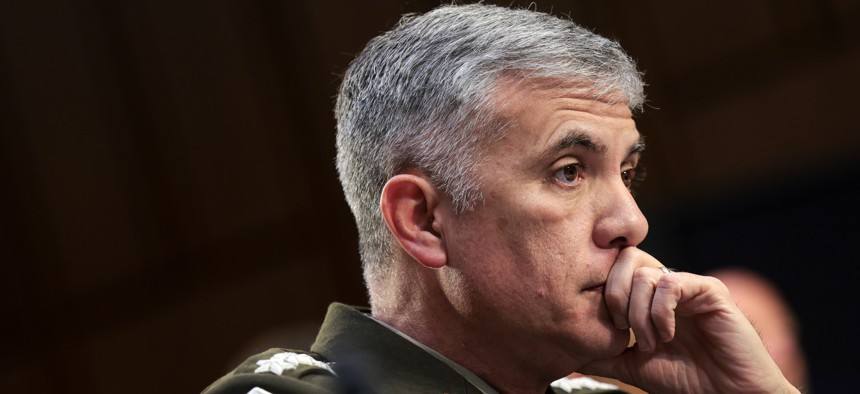Nakasone nixes the idea of an info-ops sub command

Gen. Paul Nakasone, head of NSA and CyberCommand, testifies before a Senate hearing March 10, 2022. Kevin Dietsch/Getty Images
Gen. Paul Nakasone, the commander of U.S. Cyber Command, told lawmakers he wanted to integrate more personnel trained in information operations into cyber teams.
U.S. Cyber Command needs more personnel trained in information operations – not a sub-command dedicated to it, according to a top defense official.
Gen. Paul Nakasone, the commander of U.S. Cyber Command, told lawmakers that he didn't think that having a dedicated sub-unified command focused on information operations is the best solution to unify defense priorities in the arena. But the dual-hatted director of the National Security Agency also said he wanted to boost the specialized workforce trained in information operations – generally defined as including tactical information collection and propaganda campaigns – because it's used in "every cyber mission that we do."
"I'm not sure it's a fit or a solution that's built to a sub-unified command," Nakasone said during a House Armed Services Committee Subcommittee on Intelligence and Special Operations hearing on March 17.
"What I would say is we need more information operations trained personnel that come to our command…let's get more trained information operations specialists. Let's integrate them into our teams," Nakasone said in an exchange with Rep. Jimmy Panetta (D-Calif.).
As attention to the information environment has increased in recent years both in the public sphere and by the Defense Department, Nakasone said it's an effort that he's working with the military services on, declining to provide more detail on how to improve joint training in the open hearing.
Will Biden split up NSA and Cyber Command?
The long standing question of whether control of NSA and Cyber Command should be split also came up during the March 17 hearing with Nakasone saying the matter was ultimately a "policy level" discussion that is still being considered.
However, Nakasone, who has been in the position about four years, said that the dual-hat arrangement has "allowed us to do is been able to take and be able to focus efforts from the National Security Agency and US Cyber Command on very, very difficult problems – influence, ransomware, strategic competition, in one domain in cyberspace" from elections to ransomware and the now ongoing Russia Ukraine crisis.
Ronald Moultrie, the undersecretary of defense for intelligence and security, told lawmakers that the administration was considering the split and aims to "not do any harm."
"I would say that, from a Department of Defense perspective, we certainly recognize the value of the dual hat role that General Nakasone has played for the last four years and the role of Cyber Command and NSA over the last 12 years plus. I believe that the dual hat will be looked at again by this administration just to ensure that we understand what the value added is, but also what the impacts are," Moultrie said.
"We understand that there is sentiment on both sides to really not do any harm, but I believe that it will be looked at."
Rep. Don Bacon (R-Neb.), who supports the dual-hat structure, pointed out that such an organizational divide could affect operations and lead to directional conflict as much of Cyber Command's teams consisted of NSA folks.
"I mean, these cyber teams, the core of them are NSA folks. So, if you have two four-stars with different visions and different [directions], I don't see how you keep a unified direction for the cyber team. But that's just my two cents of being down at the O5, O6, O7 level when I was in," Bacon said.
NEXT STORY: Pentagon releases JADC2 implementation plan






